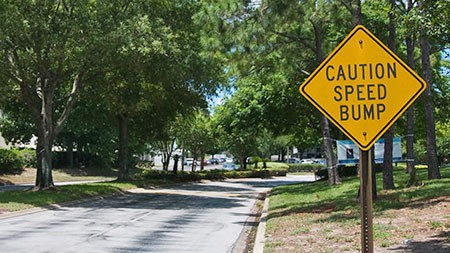Breaking the rules in a complex or estate can lead to a fine, but are you obligated to pay it?
Upon checking your mailbox, which is usually empty thanks to the invention of email, you’re surprised to find a white envelope with the signature of your Homeowners Association and your name just below it.
Contained therein is bold red typeface notifying you of a R500 fine for exceeding the 35 km/hour speed limit within the estate. After the wave of panic that follows getting caught red handed has abated, a new sense of unjustified indignation follows: What right do they have to issue fines?
Always read the rules before you buy
Well, according to the law, they do have exactly that right in the form of management and conduct rules. “As with most terms and conditions sheets, most homeowners blindly sign these documents without taking the time to conduct a close reading of the regulations and consequent repercussions contained therein. In the same way that homeowners can easily violate these rules without knowing it, governing bodies can also get away with issuing fines for things that are not stipulated in the rules ,” says Adrian Goslett, Regional Director and CEO of RE/MAX of Southern Africa.
The first thing homeowners should do when issued with a fine by their HOA or Body Corporate is to get hold of the latest copy of the rules. “A copy of these rules should be readily available to all residents. If you were not informed of these rules upon purchasing within the estate, or if amendments were made to the document without a resident’s meeting to discuss the proposed changes, then you might be able to make a case for having the fine scrapped,” says Goslett.
Speeding fines
When it comes to speeding fines specifically, residents should also find out whether the roads within the estate are registered as public roads or private roads. If public, then HOAs will need to have received permission from the relevant MEC in terms of section 57(6) of the NRTA to put up their own road signs and enforce their own traffic fines. If they’ve failed to do this, then they may not issue fines. However, all other regulations regarding public roads are still enforceable. If the roads are registered as private roads, then the HOAs rules of conduct are the regulations that govern these roads and you will have to adhere to them.
Read more: High Court ruling has big implications for gated estates
The requirement to issue warnings
But, just as an officer fires a warning shot into the air to try and get the perpetrator to give up before anyone gets hurt, HOAs and Body Corporates are required to issue warnings before they may issue fines.
“If you received no such warning before being receiving the fine, then your body corporate is acting prematurely and you are justified in reminding them of the due protocol.”
“According to the act, the accused resident is also meant to be invited to attend a meeting with the trustees if the problem persists after the first warning has been issued. At this meeting, the resident may plead his/her case and argue for why further action should not be taken. If you believe that you have been treated unfairly, then your best line of defence would be to argue that whatever rule you may have broken is not reasonable, fair and equally applied to all owners in the complex, as these are the legally binding parameters for setting up rules within sectional titles,” says Goslett.
Are tenants liable for fines?
The only alternate excuse against HOA issued fines can only be raised by tenants renting within the estate. “Governing bodies of sectional titles may only issue fines to the owner of the property and not to the tenant that is currently occupying it. The landlord may stipulate in the rental agreement whether the tenant will be liable for such fines, but the body corporate cannot take it upon itself to decide this,” Goslett explains.
As a final piece of advice, Goslett suggests that homeowners keep themselves informed by subscribing to estate newsletters and by attending the regular resident’s meetings. “Information is power. The less informed you choose to be, the easier it will be to get taken advantage of,” Goslett concludes.




